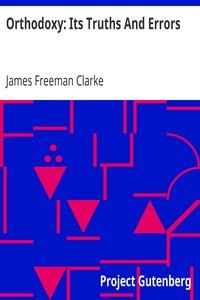Read this ebook for free! No credit card needed, absolutely nothing to pay.
Words: 192792 in 41 pages
This is an ebook sharing website. You can read the uploaded ebooks for free here. No credit cards needed, nothing to pay. If you want to own a digital copy of the ebook, or want to read offline with your favorite ebook-reader, then you can choose to buy and download the ebook.
PREFACE
The Protestant Reformation has its Principle and its Method. Its Principle is Salvation by Faith, not by Sacraments. Its Method is Private Judgment, not Church Authority. But private judgment generates authority; authority, first legitimate, that of knowledge, grows into the illegitimate authority of prescription, calling itself Orthodoxy. Then Private Judgment comes forth again to criticise and reform. It thus becomes the duty of each individual to judge the Church; and out of innumerable individual judgments the insight of the Church is kept living and progressive. We contribute one such private judgment; not, we trust, in conceit, but in the hope of provoking other minds to further examinations.
? 1. Object and Character of this Book.
The peculiarity of the book now offered to the religious public by the government of the American Unitarian Association, is this--that it is an honest attempt to find and state the truth contained in the doctrines of their opponents. It is, perhaps, something new for an association established to defend certain theological opinions, and baptized with a special theological name, to publish a work intended to do justice to hostile theories. The too usual course of each sect has been, through all its organs, to attack, denounce, undervalue, and vilify the positions taken by its antagonists. This has been considered as only an honest zeal for truth. The consequence has been, that no department of literature has been so unchristian in its tone and temper as that of sectarian controversy. Political journals heap abuse on their opponents, in the interest of their party. But though more noisy than the theological partisans, they are by no means so cold, hard, or unrelenting. Party spirit, compared with sectarian spirit, seems rather mild.
? 2. Progress requires that we should look back as well as forward.
And yet we believe that, in the religious progress of the race, Christianity is an advance on Judaism, Protestant Christianity an advance on Roman Catholic Christianity, and Liberal and Rational Christianity an advance on Church Orthodoxy. But all such advances are subject to reaction and relapse. Reaction differs from relapse in this, that it is an oscillation, not a fall. Reaction is the backward swing of the wave, which will presently return, going farther forward than before. Relapse is the fall of the tide, which leaves the ships aground, and the beach uncovered. Reaction is going back to recover some substantial truth, left behind in a too hasty advance. Relapse is falling back into the old forms, an entire apostasy from the higher stand-point to the lower, from want of strength to maintain one's self in the advance.
The Epistle to the Hebrews deserves especial study by those who desire to understand the philosophy of intellectual and spiritual progress. It was written to counteract a tendency among the Jewish Christians to relapse into Judaism. These Christians missed the antiquity, the ceremony, the authority of the old ritual. Their state of mind resembled that of the extreme High Church party in the Church of England, who are usually called Puseyites. They were not apostates or renegades, but backsliders. They were always lamenting the inferiority of Christianity to Judaism, in the absence of a priesthood, festival, sacrifices. It hardly seemed to them a church at all. The Galatians, to whom Paul wrote, had actually gone over and accepted Jewish Christianity in the place of Christianity in its simplicity and purity. The Hebrews had not gone over, but were looking that way. Therefore the writer of the Epistle to the Hebrews endeavors to show them that all which was really good in the Jewish priesthood, temple, ritual, was represented in Christianity in a higher form. It had been fulfilled in the New Covenant. Nothing real and good can pass away till it is fulfilled in something better. Thus the Roman Catholic Church stands, as a constant proof that Protestant Christianity yet lacks some important Christian element which Romanism possesses. Orthodoxy, confuted, as we suppose, over and over again, by the most logical arguments, stands firm, and goes forward.
Let us, then, re?xamine the positions of our antagonists--not now merely in order to find the weak places in their line of battle, but to discover the strong ones. Let us see if there be any essential, substantial truth in this venerable system, to which we have as yet not done justice. If there be, justice and progress will both be served by finding and declaring it.
We ask, What are the substantial truths, and what the formal errors, of Orthodoxy? But what do we mean by these terms?
? 3. Orthodoxy as Right Belief.
The term "Evangelical" is, perhaps, not as objectionable as Orthodox, though it carries with it a similar slur on those of other beliefs. It says, "We are they who believe the gospel of Christ; those who differ from us do not believe it." It is like the assumption by some of the Corinthians of the exclusive name of Christians. "We are of Christ," said they--meaning that the followers of Paul and Apollos were not so.
Probably the better part of those who take the name of Orthodox, or Evangelical, intend no such arrogance. All they want is some word by which to distinguish themselves from Unitarians, Universalists, &c. They might say, "We have as good a right to complain of your calling yourselves 'Rational Christians' or 'Liberal Christians'--assuming thereby that others are not rational or liberal. You mean no such assumption, perhaps; neither do we when we call ourselves 'Orthodox' or 'Evangelical.' When we can find another term, better than these, by which to express the difference between us, we will use it. We do not intend by using these words to foreclose argument or to beg the question. We do not mean by Orthodoxy, right belief; but only a certain well-known form of doctrine."
Free books android app tbrJar TBR JAR Read Free books online gutenberg
More posts by @FreeBooks


: Harper's Young People July 20 1880 An Illustrated Weekly by Various - Children's periodicals American Harper's Young People









